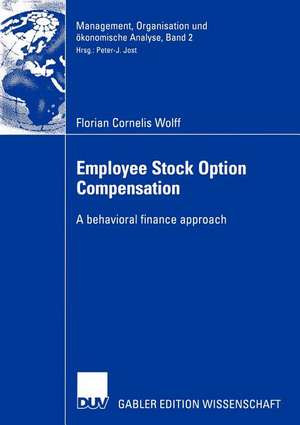Employee Stock Option Compensation: A behavioral finance approach: Management, Organisation und ökonomische Analyse, cartea 2
Autor Florian Wolffen Limba Engleză Paperback – 10 dec 2004
Din seria Management, Organisation und ökonomische Analyse
-
 Preț: 380.07 lei
Preț: 380.07 lei -
 Preț: 454.37 lei
Preț: 454.37 lei -
 Preț: 384.31 lei
Preț: 384.31 lei -
 Preț: 445.12 lei
Preț: 445.12 lei -
 Preț: 482.74 lei
Preț: 482.74 lei -
 Preț: 451.48 lei
Preț: 451.48 lei - 15%
 Preț: 436.76 lei
Preț: 436.76 lei -
 Preț: 419.43 lei
Preț: 419.43 lei -
 Preț: 379.86 lei
Preț: 379.86 lei -
 Preț: 353.79 lei
Preț: 353.79 lei -
 Preț: 389.88 lei
Preț: 389.88 lei -
 Preț: 386.39 lei
Preț: 386.39 lei - 15%
 Preț: 476.63 lei
Preț: 476.63 lei -
 Preț: 445.88 lei
Preț: 445.88 lei -
 Preț: 447.24 lei
Preț: 447.24 lei -
 Preț: 370.66 lei
Preț: 370.66 lei - 13%
 Preț: 378.75 lei
Preț: 378.75 lei
Preț: 580.68 lei
Preț vechi: 683.15 lei
-15% Nou
Puncte Express: 871
Preț estimativ în valută:
111.12€ • 118.82$ • 92.64£
111.12€ • 118.82$ • 92.64£
Carte tipărită la comandă
Livrare economică 17 aprilie-01 mai
Preluare comenzi: 021 569.72.76
Specificații
ISBN-13: 9783824482139
ISBN-10: 3824482134
Pagini: 272
Ilustrații: XV, 253 p. 29 illus.
Dimensiuni: 148 x 210 x 14 mm
Greutate: 0.33 kg
Ediția:Softcover reprint of the original 1st ed. 2004
Editura: Deutscher Universitätsverlag
Colecția Deutscher Universitätsverlag
Seria Management, Organisation und ökonomische Analyse
Locul publicării:Wiesbaden, Germany
ISBN-10: 3824482134
Pagini: 272
Ilustrații: XV, 253 p. 29 illus.
Dimensiuni: 148 x 210 x 14 mm
Greutate: 0.33 kg
Ediția:Softcover reprint of the original 1st ed. 2004
Editura: Deutscher Universitätsverlag
Colecția Deutscher Universitätsverlag
Seria Management, Organisation und ökonomische Analyse
Locul publicării:Wiesbaden, Germany
Public țintă
ResearchCuprins
Tabel of contents.- 1. Introduction to the topic.- 1.1. Relevance of the topic.- 1.2. Questions posed.- 1.3. Summary conclusions.- 1.4. Outline of the structure of the book.- 2. Theoretical & empirical assessment.- 2.1. Definition of a stock option plan.- 2.2. Review of stock option plan use.- 2.3. Empirical analysis of the use of stock option plans.- 2.4. Conclusion.- 3. Review of risk-neutral valuation models.- 3.1. Importance of valuing stock options.- 3.2. Valuing stock options from the company perspective.- 3.3. Valuing stock options from the executive’s perspective.- 3.4. Conclusion.- 4. Utility-based stock-option valuation.- 4.1. General introduction to expected utility models.- 4.2. Hall-Murphy model.- 4.3. Modifications to the ‘traditional’ EU model.- 4.4. Implications for a new model of subjective valuation.- 5. A new model to value executive stock option.- 5.1. Model specification and implementation.- 5.2. Model outputs.- 5.3. Summary of model findings and first hypotheses.- 6. Experimental test of subjective valuations.- 6.1. Purpose of the experiment.- 6.2. Experimental design.- 6.3. Experimental results.- 6.4. Implications for the valuation model.- 7. Conclusion and outlook.- 7.1. Summary conclusions.- 7.2. Future research agenda.- Appendix I.- Appendix I.
Notă biografică
Dr. Florian Wolff promovierte bei Prof. Dr. Peter-J. Jost am Lehrstuhl für Organisationstheorie der Wissenschaftlichen Hochschule für Unternehmensführung (WHU) in Vallendar. Er ist Unternehmensberater bei McKinsey & Company, Inc. in München.
Textul de pe ultima copertă
Stock options have become a common part of the compensation of executives in many companies. Their use has created a significant amount of controversy among academics as well as among the general public.
Florian Cornelis Wolff addresses an aspect often overlooked in debate but crucial for assessment: How do executives themselves see their stock options? How do their personal expectations and risk preferences affect the value they assign to them? To answer these questions classical option valuation approaches need to be combined with recent findings from the field of behavioural finance. The result is quite surprising: It is because people behave irrationally that stock options may be worth their money.
Florian Cornelis Wolff addresses an aspect often overlooked in debate but crucial for assessment: How do executives themselves see their stock options? How do their personal expectations and risk preferences affect the value they assign to them? To answer these questions classical option valuation approaches need to be combined with recent findings from the field of behavioural finance. The result is quite surprising: It is because people behave irrationally that stock options may be worth their money.









